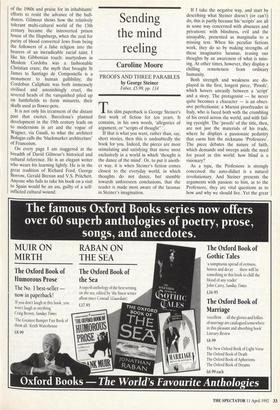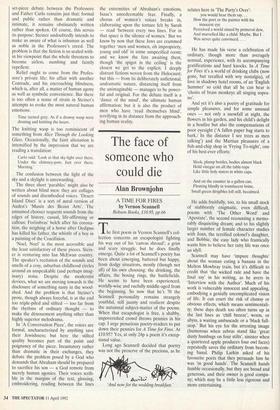Sending the mind reeling
Caroline Moore
PROOFS AND THREE PARABLES by George Steiner
Faber, £5.99, pp. 114
This slim paperback is George Steiner's first work of fiction for ten years. It contains, in his own words, 'allegories of argument, or "scripts of thought"'.
If that is what you want, rather than, say, short stories, then this is undoubtedly the book for you. Indeed, the pieces are most stimulating and satisfying that move most exclusively in a world in which 'thought is the dance of the mind'. Or, to put it anoth- er way, it is when Steiner's fiction comes closest to the everyday world, in which thoughts do not dance, but stumble towards unforeseen conclusions, that the reader is made most aware of the lacunae in Steiner's imagination. If I take the negative way, and start by describing what Steiner doesn't (or can't) do, this is partly because his 'scripts' are all in some way concerned with absences and privations: with blindness, evil and the unsayable, presented as marginalia to a missing text. When his peculiar fictions work, they do so by making strengths of these imaginative lacunae, teasing our thoughts by an awareness of what is miss- ing. At other times, however, they display a chilling remoteness from ordinary humanity.
Both strength and weakness are dis- played in the first, longest piece, 'Proofs', which hovers uneasily between a 'script' and a story. The protagonist — he never quite becomes a character — is an obses- sive perfectionist: a Marxist proofreader in Italy, who is faced both with the crumbling of his creed across the world, and with fail- ing eyesight. The 'proofs' of the title, then, are not just the materials of his trade, where he displays a passionate pedantry that earns him the nickname 'Professore'. The piece debates the nature of faith, which demands and sweeps aside the need for proof in this world: how blind is a visionary?
As a type, the Professore is strongly conceived: the auto-didact is a natural revolutionary. And Steiner presents the arguments with passion: to him, as to the Professore, they are vital questions as to how and why we should live. Yet the great set-piece debate between the Professore and Father Carlo remains just that: formal and public rather than dramatic and intimate, it remains obstinately written rather than spoken. Of course, this serves its purpose: Steiner undoubtedly intends to make us aware of what is inhuman as well as noble in the Professore's creed. The problem is that the fiction is so sealed with- in his viewpoint that the whole threatens to become airless, numbing and faintly repellent.
Relief ought to come from the Profes- sore's private life: his affair with another Comrade, and his encroaching blindness, which is, after all, a matter of human agony as well as symbolic convenience. But there is too often a sense of strain in Steiner's attempts to evoke the most natural human emotions:
Time turned grey. As if a drowsy wasp were droning and knitting the hours.
Carlo said: 'Look at that sky-light over there. Under the chimney-pots. Just over there. Morning.'
The confusion between the light of the sky and a skylight is unrewarding.
The three short 'parables' might also be written about blind men: they are collages of sounds and disembodied voices. 'Desert Island Discs' is a sort of aural version of Auden's `Musee des Beaux Arts'. The unnamed chooser requests sounds from the edges of history, casual, life-affirming or callous: Foitinbras' belch after his corona- tion, the neighing of a horse after Oedipus has killed his father, the whistle of a boy in a painting of the Crucifixion.
'Noel, Noel' is the most accessible and the least satisfactory of these pieces. Stein- er is venturing into Ian McEwan country. The speaker's recitation of the sounds and smells of a cosy, suburban childhood circles around an unspeakable (and perhaps imag- inary) noise. Despite the modernist devices, what we are moving towards is the disclosure of something nasty in the wood- shed. And the problem is that Steiner's Kok, though always forceful, is at the end too triple-piled and stilted — too far from the rhythms of ordinary thought — to make the denouement anything other than highly superior melodrama.
In 'A Conversation Piece', the voices are formal, uncharacterised by anything save their Jewishness; but here the stilted quality becomes part of the point and poignancy of the piece. Incantatory rather than dramatic in their exchanges, they debate the problem posed by a God who demands that Abraham should be prepared to sacrifice his son — a God remote from merely human agonies. Their voices scrib- ble in the margins of the text, glossing, embroidering, reading between the lines something from Alice Through the Looking Glass. Occasionally, the faint alienation is intensified by the impression that we are reading a translation: the extremities of Abraham's emotions, Isaac's unredeemable fear. Finally, a chorus of women's voices breaks in, elaborating upon the torture felt by Sarah — read 'between every two lines. For in that space is the silence of women.' But we know by now that these Jews are crammed together 'men and women, oh impropriety, young and old' in some unspecified room; and we know the fate awaiting them, though 'the spigot in the ceiling' is the closest we get to the explicit. I deeply distrust fictions woven from the Holocaust; but this — from its deliberately unfictional, undramatic nature, distancing itself from the unimaginable — manages to be power- ful and original. For the debate itself is a 'dance of the mind', the ultimate human affirmation; but it is also the product of men who have 'read themselves blind', terrifying in its distance from the approach- ing human reality.



















































 Previous page
Previous page